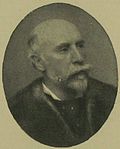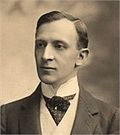Tunbridge (UK Parliament constituency)
 From Wikipedia - Reading time: 6 min
From Wikipedia - Reading time: 6 min
| Tunbridge | |
|---|---|
| Former county constituency for the House of Commons | |
| 1885–1918 | |
| Seats | one |
| Created from | Mid Kent |
| Replaced by | Tonbridge |
Tunbridge was a parliamentary constituency in Kent, centred on the town of Tonbridge. It returned one Member of Parliament (MP) to the House of Commons of the Parliament of the United Kingdom.
It was created for the 1885 general election, and abolished for the 1918 general election, when it was replaced by the new Tonbridge constituency.
Boundaries
[edit]The Sessional Divisions of Tunbridge and Tunbridge Wells, and part of the Sessional Division of Malling.
Members of Parliament
[edit]| Election | Member | Party | |
|---|---|---|---|
| 1885 | Robert Norton | Conservative | |
| 1892 | Arthur Griffith-Boscawen | Conservative | |
| 1906 | Alfred Paget Hedges | Liberal | |
| 1910 | Herbert Spender-Clay | Conservative | |
| 1918 | constituency abolished: see Tonbridge | ||
Elections
[edit]Elections in the 1880s
[edit]
| Party | Candidate | Votes | % | ±% | |
|---|---|---|---|---|---|
| Conservative | Robert Norton | 4,533 | 51.8 | ||
| Liberal | Frederick Verney | 4,210 | 48.2 | ||
| Majority | 323 | 3.6 | |||
| Turnout | 8,743 | 81.7 | |||
| Registered electors | 10,703 | ||||
| Conservative win (new seat) | |||||
| Party | Candidate | Votes | % | ±% | |
|---|---|---|---|---|---|
| Conservative | Robert Norton | Unopposed | |||
| Conservative hold | |||||
Elections in the 1890s
[edit]
| Party | Candidate | Votes | % | ±% | |
|---|---|---|---|---|---|
| Conservative | Arthur Griffith-Boscawen | 4,821 | 55.4 | N/A | |
| Liberal | Frederick William Pavy | 3,888 | 44.6 | New | |
| Majority | 933 | 10.8 | N/A | ||
| Turnout | 8,709 | 69.7 | N/A | ||
| Registered electors | 12,494 | ||||
| Conservative hold | Swing | N/A | |||
| Party | Candidate | Votes | % | ±% | |
|---|---|---|---|---|---|
| Conservative | Arthur Griffith-Boscawen | Unopposed | |||
| Conservative hold | |||||
Elections in the 1900s
[edit]
| Party | Candidate | Votes | % | ±% | |
|---|---|---|---|---|---|
| Conservative | Arthur Griffith-Boscawen | 5,576 | 61.5 | N/A | |
| Liberal | C Cory | 3,494 | 38.5 | New | |
| Majority | 2,082 | 23.0 | N/A | ||
| Turnout | 9,070 | 67.1 | N/A | ||
| Registered electors | 13,519 | ||||
| Conservative hold | Swing | N/A | |||

| Party | Candidate | Votes | % | ±% | |
|---|---|---|---|---|---|
| Liberal | Alfred Paget Hedges | 7,170 | 54.9 | +16.4 | |
| Conservative | Arthur Griffith-Boscawen | 5,887 | 45.1 | −16.4 | |
| Majority | 1,283 | 9.8 | N/A | ||
| Turnout | 13,057 | 84.2 | +17.1 | ||
| Registered electors | 15,500 | ||||
| Liberal gain from Conservative | Swing | +16.4 | |||
Elections in the 1910s
[edit]| Party | Candidate | Votes | % | ±% | |
|---|---|---|---|---|---|
| Conservative | Herbert Spender-Clay | 9,240 | 60.5 | +15.4 | |
| Liberal | Alfred Paget Hedges | 6,030 | 39.5 | −15.4 | |
| Majority | 3,210 | 21.0 | N/A | ||
| Turnout | 15,270 | 89.2 | +5.0 | ||
| Conservative gain from Liberal | Swing | +15.4 | |||
| Party | Candidate | Votes | % | ±% | |
|---|---|---|---|---|---|
| Conservative | Herbert Spender-Clay | 8,286 | 57.4 | −3.1 | |
| Liberal | Alfred Paget Hedges | 6,159 | 42.6 | +3.1 | |
| Majority | 2,127 | 14.8 | −6.2 | ||
| Turnout | 14,445 | 84.4 | −4.8 | ||
| Conservative hold | Swing | ||||
General Election 1914–15:
Another General Election was required to take place before the end of 1915. The political parties had been making preparations for an election to take place and by July 1914, the following candidates had been selected;
- Unionist: Herbert Spender-Clay
- Liberal:
References
[edit]Licensed under CC BY-SA 3.0 | Source: https://en.wikipedia.org/wiki/Tunbridge_(UK_Parliament_constituency)25 views | Status: cached on July 17 2025 19:01:46↧ Download as ZWI file
 KSF
KSF